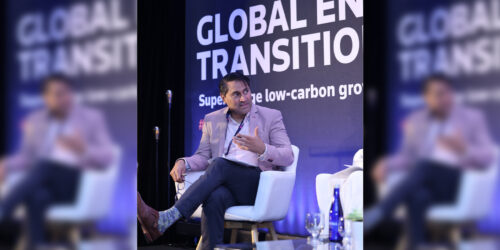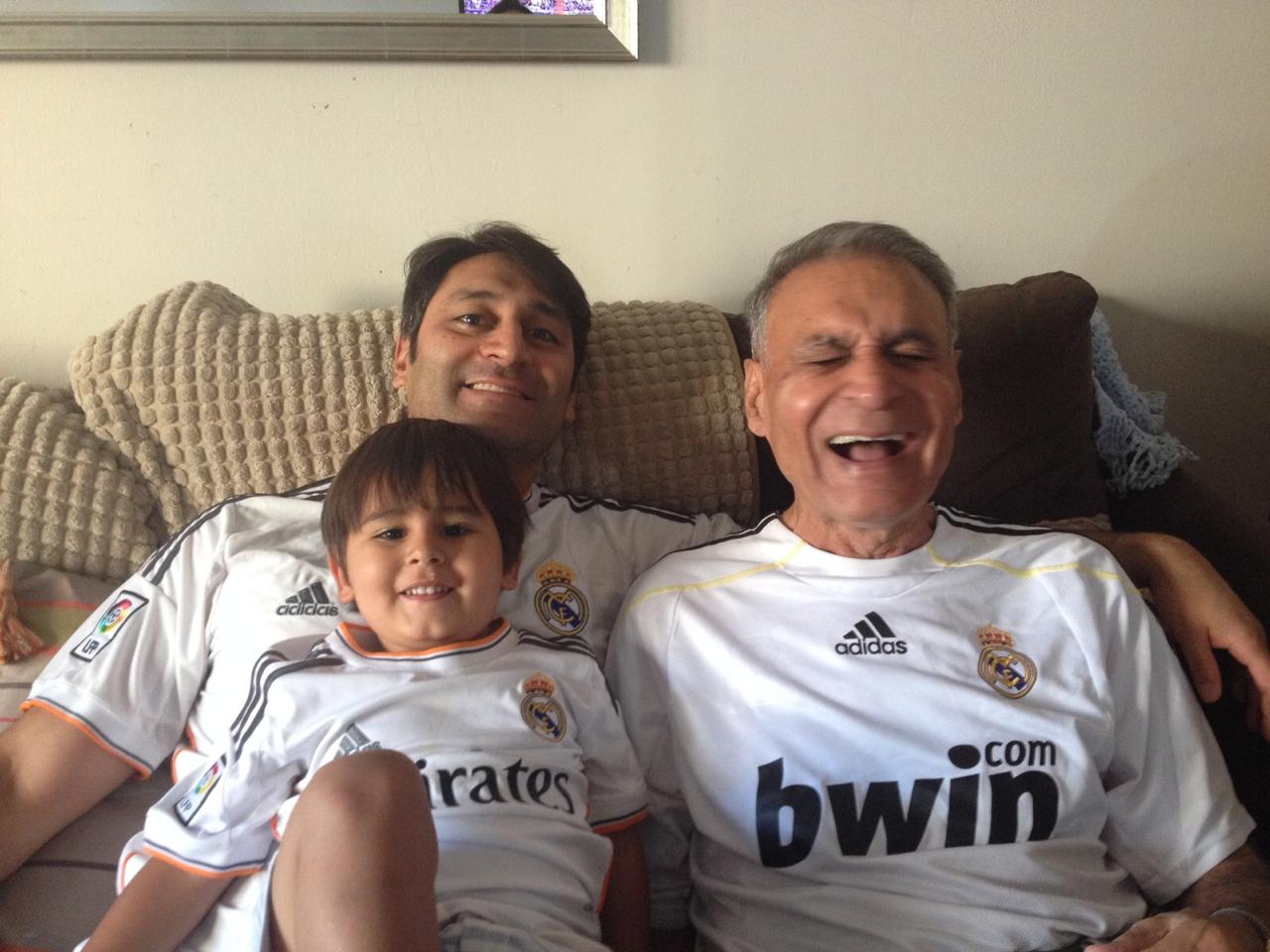
Vikram Singh: Bringing His Global Mindset to RMI
This RMI senior director and global citizen helps drive RMI’s influential work in new geographies around the world.
Vikram Singh is truly a global citizen — considering himself equal parts Indian, Spanish, and American. Having struggled with consolidating three continents into his personal identity for years, he now leverages his multi-cultural background as a strength to serve as a subject matter expert and thought leader to the international community on topics ranging from development, climate finance access, capacity building, scaled ambition, and climate adaptation and mitigation. In doing so, Singh helps RMI to execute partnerships, strategies, communications, and campaigns to influence the international community and global climate agenda and support RMI’s work across Global South geographies.
RMI is a unique place, where I can be all of myself.
In a lot of ways, Singh credits his father’s perseverance and tenacity in helping him arrive at where he is today. His Sikh family hails from what is now central Pakistan, and were displaced during the British Partition of India to a refugee camp, penniless, when Singh’s father was a teenager. Through a lottery system, his father ended up resettled in Germany, as the country was looking for men to help rebuild after World War II.
At that time, nuclear energy was the hot energy innovation topic, and through an apprenticeship program that began with menial labor, Singh’s father eventually moved up the ranks to become a nuclear engineer. With stops in Canada and the United States, Singh’s family eventually ended up in Madrid, where Singh’s father helped design and build Spain’s first nuclear plant, and where Singh grew up discussing the physics of electrons, grid infrastructure, and the art and science of engineering at the family dinner table.

Finding his identity
At that time, it was common for Spanish professionals to send their children to boarding school abroad to learn English. So when Singh was 13 years old, he ended up in Kansas, and got his first dose of America. “I didn’t know how to explain who I was, and people didn’t know how to explain me,” Singh says about his time in Kansas. “It was an awkward time trying to find my identity and voice — but I did love Dairy Queen.”
Singh ended up completing his schooling in Washington, D.C., where he fell in love with finance. “The numbers made a lot of sense to me — there was nothing abstract about them when so much else of the world around me was,” he says. It was also when Singh read “The Prize: The Epic Quest for Oil, Money, & Power” by Daniel Yergin, a book he credits with changing his life. “That book showed me that energy touched everyone’s life,” he explains. “For a young ambitious kid with identity issues, and with energy always lurking in my mind, I immediately knew this was my future. I wanted to be a part of all of it, the engineering, the finance, the politics and policy, and the diplomacy.”
After finishing first in his class with an MBA in international business at The George Washington University, he was ready for the next step. “There was a career center and job fair, but I wanted to chart a course of my own. I asked around and everyone told me, investment banking,” he says. So he moved to New York and started cold calling investment banks asking to be a part of their energy groups.
From numbers to partnerships
After speaking with several banks, he landed a job with Prudential Securities as an oil and gas (exploration and production) investment banker — mostly because they were willing to relocate him to Houston. He spent the next few years working at different banks and in the executive offices of two FORTUNE 500 energy companies, Enron Corp and Constellation Energy. Singh eventually decided to go to India to set up an energy consultancy business. “It was the dumbest idea I ever had,” he says. “Because I realized I had no idea just how complex India is, and what I really added to anything besides somehow being linked to the Subcontinent. I think my identity issues got the better of me.” But the work did lead him toward United Nations projects, and eventually to UN headquarters in New York where UNDevelopment Programme’s (UNDP) executive office was looking to build its first Enterprise Risk Management (ERM) system — a clear connection back to Singh’s passion for finance and global energy experience.
After working in the UNDP executive office and finance department for a number of years, someone from the UN partnerships team approached Singh. “You know the numbers really well, you know the analysis really well, but you have a human touch,” this man told Singh. “You can explain things in a way that our funders and regular people can understand.” So he asked Singh to join the partnerships team, where Singh learned he had a gift for driving fundraising and impact. In fact, there Singh helped land the largest ever contribution the UN system — $1.3 billion from the government of Spain, working directly with the Prime Minister and his team. From there, he had a ringside seat to global diplomacy — meeting heads of state and ministers and understanding how to navigate the global political landscape.
And on to distributed energy
In 2014, Dr. Judith Rodin, then president of The Rockefeller Foundation, wanted to create an ambitious program called “100 Resilient Cities.” She was looking for people who were multicultural and could operate in various geographies and influence political agendas. Singh fit the bill, so “all of a sudden I was tossed into politics, mostly at the city and regional level,” he says. “What we found is that the central issue that all cities were grappling with was energy reliability and specifically the energy/water nexus.” Thus began Singh’s journey into distributed energy.
After serving as the Asia-Pacific regional director for Rockefeller/100 Resilient Cities, and briefly returning to the UN as the CFO’s senior adviser on innovative finance, Singh got a call from RMI’s Jon Creyts. “You’ve had a great career and background,” Creyts said. “We do impact at RMI, and if you’re interested in impact, this could be a place for you.”
It didn’t take much convincing for Singh to join the RMI team. He now supports Creyts, RMI’s CEO, in the international arena, and helps lead RMI’s work in the Global South. “In some ways my role is kind of undefined, which is really thrilling and overwhelming all at once,” Singh says, as he heads out to chair a Reuters Global Energy Transition conference with 750 global CEOs. “RMI is such a strong brand and known to have the best and brightest sustainable energy minds in the industry, and with 30 years in the industry I am still not the smartest person in the room,” says Singh. “The pace of change is so fast, all one can do at times is work to scale what markets have already recognized.”
But as overwhelming as it can get, Singh has had a huge impact at RMI. He started a blended finance program, helped start an initiative to tackle methane emissions in the Global South, and has worked with the RMI’s development team to raise many millions of dollars for RMI over the past several years. In addition, he is helping RMI think about its strategies in diverse geographies and how to de-risk, finance, and operationalize shovel-ready projects across the world.
Being all of himself
Reflecting back, Singh feels his work at RMI is partly a continuation of his father’s legacy —pursuing innovative energy resources and skill development. “Fifty years ago, capacity building meant finding a bright mind, bringing them to the university in your country, and then setting them free hoping for the best,” Singh says. “I get really excited about what capacity development looks like in the 21st century and how we can do that at scale.” Singh feels that his role now is to use his experience to mentor others.

“It saddens me when I hear a lot of climate doom and negativity. I think people over the years have really tried on this issue. And it’s up to us to take that baton forward,” he says. “I want to ensure that the younger generation understands they are standing on the shoulders of people who have gone through great sacrifice to bring us here — the tipping point of a truly global, systemic shift in energy systems. It’s now not a question of if it is going to happen, just how and when.”
Singh finds his work at RMI fulfilling, both on a personal and professional level. “It’s hard to say where the job stops and I begin — my personal and professional life have melded perfectly into one shape.” But beyond that, Singh feels that he has put his identity issues well in the rearview mirror. “I’m Indian Spanish American, and I’m proud of all of those things. RMI is a unique place where I can be all of myself. In fact, not a day goes by when I’m not asked to be all of that — and even more.”
“Knowing that I have helped pivot RMI to a more global mindset, helping it understand new geographies, platforms, and people in ways that it didn’t before, I think my career will be nearly complete,” Singh explains. “That is my goal, and I give my everything towards that. Yes it’s about gigawatts, but in the end it just comes down to people — and we’re all the same. I’ve finally made peace with that — and myself.”
